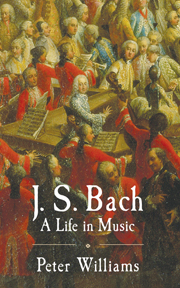Book contents
- Frontmatter
- Contents
- Preface
- Acknowledgments
- Map of Northern Germany in the time of J. S. Bach
- Map of Thuringia and Saxony in the time of J. S. Bach
- 1 Early years 1685–1703
- 2 First appointments 1703–8
- 3 Weimar 1708–17
- 4 Cöthen 1717–23
- 5 Leipzig, the first years
- 6 Leipzig, the middle years
- 7 Leipzig, the final years
- 8 Observations, descriptions, criticisms
- Epilogue
- Postscript
- Glossary
- List of references
- Index of works (BWV)
- Index of names
2 - First appointments 1703–8
Published online by Cambridge University Press: 10 December 2009
- Frontmatter
- Contents
- Preface
- Acknowledgments
- Map of Northern Germany in the time of J. S. Bach
- Map of Thuringia and Saxony in the time of J. S. Bach
- 1 Early years 1685–1703
- 2 First appointments 1703–8
- 3 Weimar 1708–17
- 4 Cöthen 1717–23
- 5 Leipzig, the first years
- 6 Leipzig, the middle years
- 7 Leipzig, the final years
- 8 Observations, descriptions, criticisms
- Epilogue
- Postscript
- Glossary
- List of references
- Index of works (BWV)
- Index of names
Summary
In [January] 1703 he went to Weimar, and became a musician of the Court there.
(Obituary)What the series of events was during 1702 can be only partly reconstructed, but it seems that Bach completed two years at senior school, visited Hamburg either during or shortly after them or both, heard the French players of Celle, at some point returned to Thuringia, by July 1702 was applying to become organist at the Jacobikirche (St James's Church), Sangerhausen, and instead went into service at the court in Weimar six months later. When exactly in 1702 he left Lüneburg is unrecorded but probably as the school year ended at Easter, when he was just seventeen. Nor is it recorded whether he was moved to return to Thuringia through penury, professional disappointment (no job in Lüneburg or Hamburg) or love of homeland, as the Obituary said. (On this, see also Postscript.) Perhaps he went temporarily to his brother in Ohrdruf again, or sister Marie Salome in Erfurt, both of whom were by now better circumstanced.
The order of events would be rather the reverse of the flute-virtuoso J. J. Quantz's, who records that at much the same age, he set his sights on Dresden or Berlin, metropolitan capitals in which he could hear better things than he could at home (1755, 202). Similarly, Handel, having briefly became organist at home in 1702 and been introduced to many styles of music by his teacher, went off to Hamburg, launched on his many-sided career.
- Type
- Chapter
- Information
- J. S. BachA Life in Music, pp. 32 - 69Publisher: Cambridge University PressPrint publication year: 2007



